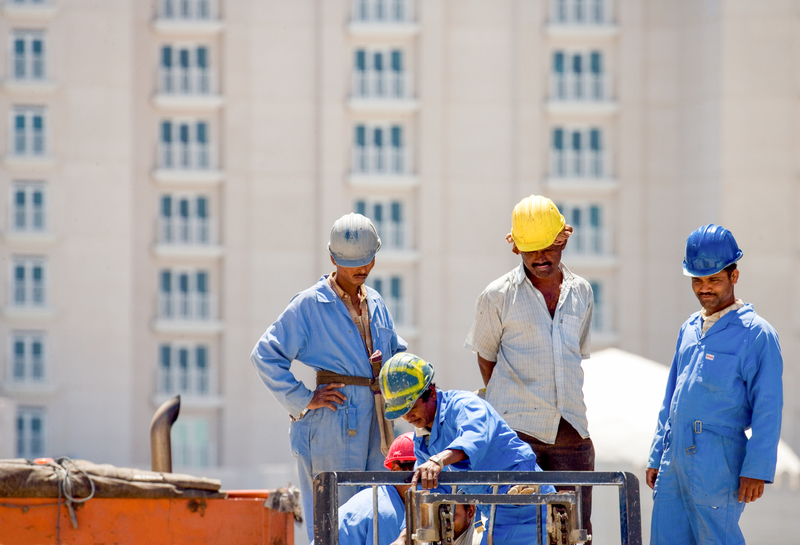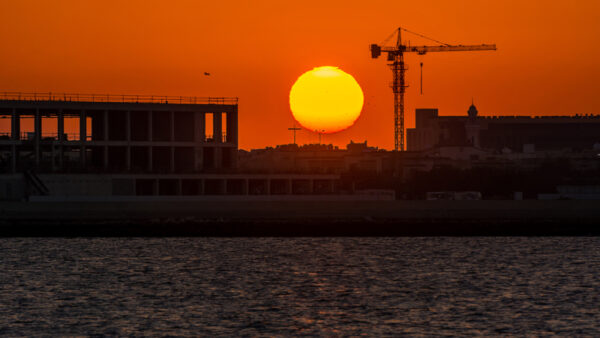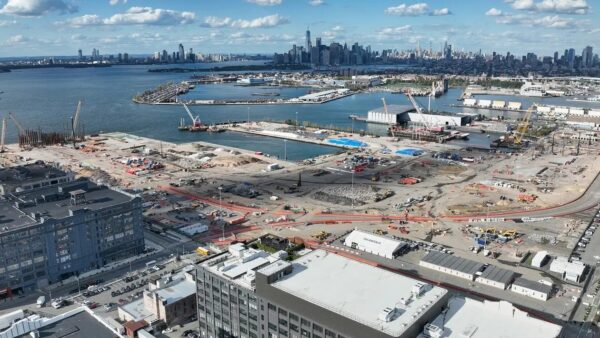We’re used to negative stories about countries chosen to host the world’s big sporting tournaments.
How the 2004 Olympics left Greece saddled with debts and a decaying stadium long after the fans had gone home.
In Brazil, where a quarter of the country lives in poverty, the £10bn ($14bn) cost of hosting the 2014 World Cup left a population enraged at expensive stadiums it no longer needed.
Now it’s Qatar’s turn to feel the heat – and that’s not just the searing desert temperatures which mean it will host the 2022 World Cup in winter, not summer.
If these measures are implemented then Qatar will be a model for other Gulf states– Sharan Burrow, General Secretary of the International Trade Union Confederation
When you win a bid to host a tournament like the Olympics or the World Cup, you have to accept that a spotlight will pierce the darkest corners of your national life.
For Greece and Brazil it was all about money. This is not a problem for Qatar, the richest country in the world per capita.
For Qatar, the issue is migrant labour and the ‘kafala’ system which can lead to workers being kept in a modern form of slavery.
It doesn’t matter that your neighbours and enemies – of which Qatar has many in the region – are operating the very same hated system.
To be exact, latest figures from the International Labour Organisation (ILO) show there are 23 million migrant workers under kafala in nine countries across the Gulf region.
But only one of those countries is hosting the next World Cup.
For eight years since it won the bid Qatar has been attacked, not only over kafala but also for the living conditions of its workers.
But with four years still to go, there are signs that the Doha government realises reforms are needed to stop a tournament costing an estimated £138bn ($180bn) being overshadowed by human rights issues.
If this is so, the 2022 World Cup could end up being a force for good, not just in Qatar but across the Middle East, if it leads to the end of kafala.
Under this system workers, mainly from South Asia and brought to the Middle East, can become open to exploitation by unscrupulous bosses who withhold passports as well as wages.
Without the necessary paperwork, known as ‘exit visas’, employees are unable to leave the country and can find themselves trapped in servitude.
This is what happened to a group of 78 workers from Nepal, India and The Philippines, highlighted in an Amnesty International report last month.
The group have not been paid since February 2016 and are owed an average of £1,500 ($2,000), which for some is the equivalent of several months’ wages.

Workers in Doha, Qatar (Giuseppemasci/Dreamstime)
One worker, Ernesto, a piping foremen from the Philippines, said he was in greater debt after working in Qatar for two years than he had been before he arrived in the country.
Amnesty says the company responsible, Mercury MENA, ‘took advantage’ of kafala, by which workers who walk away from their jobs give up any claim to unpaid debts.
So they become trapped – either working for nothing or facing arrest, loss of wages and deportation if they left their jobs without permission.
Qatar is now taking legal action against Mercury MENA, which no longer operates in the country.
It has also pledged to work with the UN and unions on a wholesale reform of kafala and its labour laws.
Earlier this year the ILO set up an office in Doha and worked with the Doha government to abolish exit visas.
Further changes allowing workers to change jobs without a ‘non-objection certificate’ from their employer are in the pipeline.
A comprehensive wage protection system is also promised, as is the reimbursement of hefty recruitment fees workers have to pay agents who find them jobs in Qatar.
A labour tribunal is also being set up to resolve disputes within three weeks. All contracts are to be lodged with government to prevent substitution with worse ones, and a support fund has been established for the government to pay for an employee’s journey home.
But, as Amnesty’s report on the 78 workers shows, the criticism won’t stop until the reforms are in place and such tales stop emerging.
In its response to Amnesty, Qatar asked for more time to fix the problem but said it was determined to be the “regional leader” on ending kafala.
Of course there are still sceptics who say Qatar can go back on its word, but this will get harder for it to do as the World Cup approaches. Why set yourself up for a fall?
For the moment, Qatar should be given the benefit of the doubt: new accommodation blocks have been built and there are currently 25,000 people working on the eight stadiums for the tournament and the associated infrastructure.
The Amnesty report related to just 78 workers and dated back to an unscrupulous company operating with ‘a cashflow problem’ in 2016.
If the Doha government is successful it will, as claimed by Sharan Burrow, General Secretary of the International Trade Union Confederation and once Qatar’s harshest critic, set a new standard for the region.
“If these measures are implemented then Qatar will be a model for other Gulf states,” she said.
For this to be case when the final whistle is blown in the Lusail Stadium in four years’ time, now that really would be something to shout about.
- Anthony Harwood is a former foreign editor of the Daily Mail
Image: Workers in Dubai (Jborzicchi/Dreamstime)
Further Reading:
Comments
Comments are closed.







A much-needed article. Very pleased to see this balanced coverage. Another important point I’ve not seen anyone report is that ALL workers (including construction workers) in Qatar receive health insurance coverage from the State of Qatar. The state-run hospitals provide health care services to all work-permit and resident-permit holders, and I’ve seen with my own eyes construction workers receiving medical treatment at the hospital, in a professional, sanitary environment that surely is superior to any health care they would have access to in their home countries.
In contrast, back in America it seems we have subcontractors, both citizens and immigrants, working on construction sites with some having no health insurance or access to decent medical treatment.
Owing to olimpic games, I hope that kafala “modern slavery” will be ended around Qatar and others.